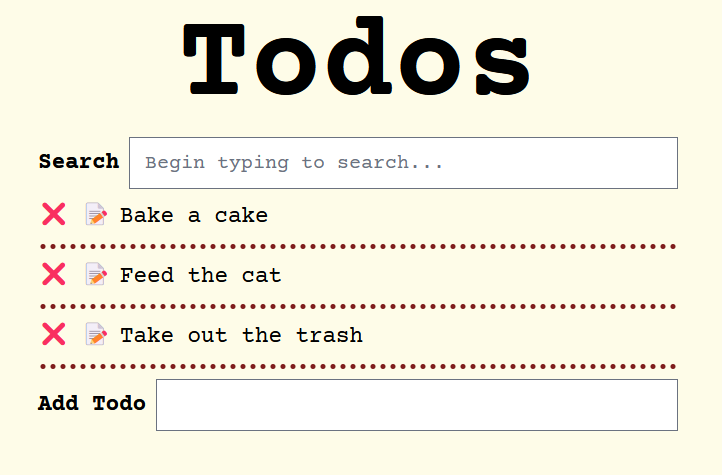Demonstration of a todo list application using:
- HTMX : high power tools for HTML
- templ : a simple templating language alternative for Go
- Tailwind CSS : a utility-first CSS framework
This is a rewrite of some todo list applications that previously demonstrated HTMX:
- Clojure version: https://github.com/ndchorley/todo
- Go version: https://github.com/quii/todo
My primary goal was to play with the templ templating library for Go.
- Clone this repository
- Install Task: https://taskfile.dev/installation/
- Run
task installto install a few dependencies
- Run
task runto start the server - Visit http://localhost:3000
Each time you run task run the templates and TailwindCSS styles are regenerated/rebuilt.
Like the two original versions, this application uses HTMX to update the UI. In this recreation, the functionality remains mostly the same with only a few minor changes. The use of templ and TailwindCSS are the main differences.
Some additional JavaScript libraries are included to help with the interactivity. I am simply including libraries that the previous Todo applications used as well to keep the functionality the same.
The original Go version used html/template to render the HTML. This version uses templ instead. The main difference is that templ uses a generation step to compile them into Go code. This means that the templates are type-safe and can be checked at compile time.
I wanted to learn more about templ, and as I stated above, this seemed like a good opportunity to try it out with some other technologies I was interested in. I wanted to see how templ would work with a low or no JavaScript frontend library like HTMX.
I didn't write any tests that tested the templates directly, which would be testing the generated code, but I did test the handlers that used the templates. I tested that the handler was returning the correct response for a normal HTML request and for the HTMX requests. To pass those tests, the handler had to return the correct content in addition to the correct status and headers. Testing the templ components was not very hard and was easy to do in the table-driven testing style.
Another difference is that all the styling is being handled with TailwindCSS. This is what Node and NPM are used for.
This application code could be more simple, but I wanted to also see how everything I was playing with might come together if I was building a larger application. For example, I could have skipped on some of the organization and directories. Also, the use of interfaces could be skipped in favor of just using the concrete types, but I wanted to make testing easier and don't find it too much of a burden to add and use them.
I ran into a few oddities and technology compatibility issues that I had to work around.
I kept having a strange issue with the rendering of the todos list. Whenever I refreshed the page only the first todo would be a child of the ul element like it should be. The second todo and on would be outside of that element. I verified the content was being generated correctly and sent to the browser correctly, but viewing the source in the inspector in multiple browsers would always show the list getting broken up.
The server would generate and send the following HTML to the browser:
<ul>
<li>...</li>
<li>...</li>
<li>...</li>
</ul>But the browser would render and show in the inspector:
<ul>
<li>...</li>
</ul>
<li>...</li>
<li>...</li>I tried both Firefox and Edge, and it was always the same weirdness. So I changed that bit of the templates to use some nested divs. This also meant changing some of the HTMX as well, but it was a small change. This avoids the issue and the list is rendered correctly now. I say "avoids the issue" because I still don't know why it was happening.
Another small issue I ran into had to do with the preferred attribute name for the _hyperscript code. It suggests you use _ as the attribute name but templ does not parse this character as a valid attribute beginning. All was not lost because _hyperscript also allows you to use data-script as the attribute name which has no problem being parsed by templ. This is what I ended up doing, and it works fine.
